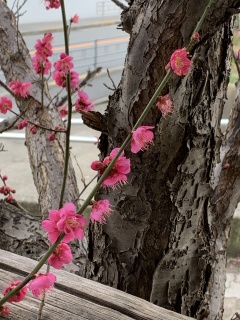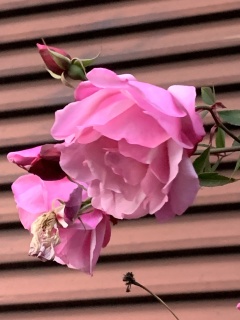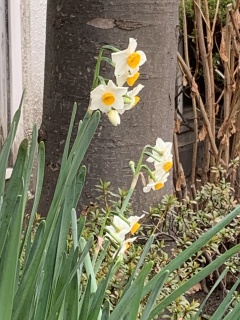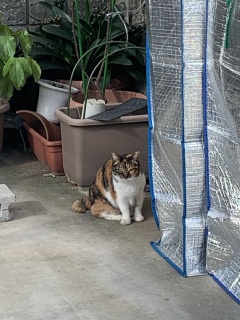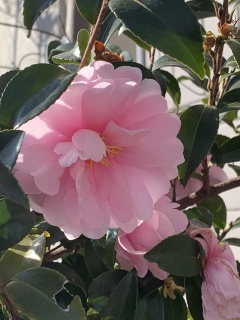Four things vaguely related to writing
I had to translate a document including the periodic table recently, a nice easy task, although there are some elements that didn’t have names the last time I took chemistry. Meitnerium is a nice one to have; oganesson looks like a place name from Le Guin, but I looked up Yuri Oganessian, the scientist honored, and found that his name is a variation of what would be Johnson in English, the more you know. Dysprosium was, I think, around the last time I checked; it always sounds to me like an SF word for writer’s block.
I was thinking about the tin soldiers in Charmed Life. When Julia and Roger play with them, they imbue them with magic to move and fight on their own. When Cat joins in, he doesn’t have (access to) his own magic, so he has to move his soldiers by hand, not surprisingly losing the battle to Roger’s forces. Roger begs Julia to help Cat out, which she does, reluctantly (she is busy reading, knitting, and eating sweets all at once, a state of being I approve of), but all the soldiers run away at the first sign of combat (“Because it’s just what I would do,” said Julia. “I can’t think why all soldiers don’t.”). Finally, after fending off Gwendolen’s attempt to snatch Cat away, Julia is fired up enough to “[fill the soldiers’] hearts with courage.” Although it doesn’t really hold up to close examination, I was thinking about this as an analogy for writing characters—sometimes they feel flat and empty and as if you have to move them clumsily around the plot by hand, sometimes they become an extension of the self, and sometimes you can make them do things you seemingly never would have managed on your own. Sadly it’s not as easy as tying a knot in a handkerchief!
I’ve been watching Parallel World and enjoying it, though I’m only a few episodes in; I have no clue what’s going on, but Bai Yu and Ni Ni are wonderful.
It must be so weird to be a scriptwriter and see the characters you create defined in ways you can’t control. I was thinking that there’s a definite Bai Yu-ness about Chang Dong in Parallel World, a warmth and wryness; if Zhu Yilong were playing the role it might be a little darker-toned and more vulnerable, Tan Jianci and so on different again. A very different experience for the writer from just creating a character in text. (I’m sure this has been discussed in depth elsewhere, it was just on my mind.) And then of course there’s NPSS who has a whole cornucopia of different realizations of his characters to choose among…
From my latest entry on senzenwomen I learned about the Republic of Ezo, a short-lived 1869 attempt at setting up an independent country in Hokkaido in semi-rebellion against the Meiji Restoration; now very tempted, if I ever finish my current original thing, to write something set in an alternate history where Hokkaido remained independent of the rest of Japan (what would have happened with Sakhalin? What about during the war? etc. etc.).
Quite a lot of new Seong-Jin Cho (new on YouTube, anyway); here he’s playing the Mozart A Major Concerto, my favorite of the classical piano concertos. Technically it’s so easy that I spent time learning the first movement myself in college, indifferent pianist that I was; SJC’s rendition is incredibly charming. Also, in a very different mood, the Ravel Concerto for the Left Hand, and Jörg Widmann’s cute little Sonatina, not quite as classical as it sounds. And while I’m at it, not a new recording, the Liszt B minor sonata—I heard someone else’s version on the radio which didn’t begin to match SJC’s fireworks and grand scale, so I had to go listen to his performance again.
A friend from grad school had a baby and I sent them my standard care package, a little stuffed animal and some picture books: the Very Hungry Caterpillar, Where the Wild Things Are (which I still love, the last line always makes me tear up), and Horton Hatches an Egg, mostly because it was the only Dr. Seuss on the shelf in Japanese. Not my favorite one—that would be a competition among Red Fish, Blue Fish, The King’s Stilts, Wocket in my Pocket, The Sleep Book, Green Eggs and Ham and so on—but I like the hatchling. Also the title seems to contain an inadvertent pun in Japanese—ホートンたまごをかえす, which is a literal translation of the English title but, written phonetically as it is, could also mean “Horton gives the egg back,” relevant to the plot in an ironic way.
Photos: Mostly flowers, the plums have already started to bloom; also a boss cat taking up its fair share of space at the end of an alley where the cats had clearly taken possession, and Koron-chan doing her 見返り美人 (beauty looking over her shoulder) thing.
Be safe and well.



